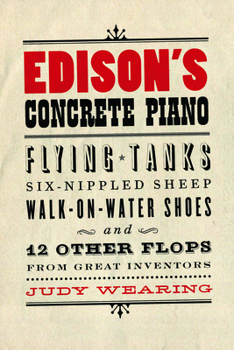Edison's Concrete Piano: Flying Tanks, Six-Nippled Sheep, Walk-on-Water Shoes, and 12 Other Flops from Great Inventors
Not even geniuses get it right the first time . . . An "entertaining" look at the failures of great inventors (Booklist) From Alexander Graham Bell's multi-nippled sheep to Leonardo da Vinci's walk-on-water shoes, these ludicrous ideas and faulty designs will leave you with a smile on your face, and the reminder that even the very best of us make mistakes To achieve great things, you have to be willing to take risks -- and as Edison's Concrete Piano reveals, some of the most famous names in history experienced plenty of flops and face-plants in the course of their careers. Thomas Edison, for example, not only revolutionized the world with the light bulb, but also designed a concrete piano, a nonoperational helicopter made from box kites and piano wire, and a machine to speak to the dead. Alexander Graham Bell, inventor of the telephone, actually devoted most of his time to his sheep farm in Nova Scotia -- devising a multi-nippled sheep somewhere along the way. You'll also read about Leonardo da Vinci's walk-on-water shoes, George Washington Carver's miracle peanut cure, and much more. The ludicrous ideas, faulty designs, and offbeat hobbies in this volume will inspire laughs -- and serve as a reminder that even the very best minds make mistakes.
Format:Paperback
Language:English
ISBN:1550228633
ISBN13:9781550228632
Release Date:October 2009
Publisher:ECW Press
Length:272 Pages
Weight:0.90 lbs.
Dimensions:0.7" x 5.5" x 8.5"
Customer Reviews
2 ratings
Concrete Pianos and Us
Published by Thriftbooks.com User , 15 years ago
A fascinating book. Wearing has woven engaging stories about the genius and failings of a number of historic and modern science pioneers. Who knew that the Great Da Vinci considered himself a failure who wasted time despite creating enough ingenious devices to fill a museum (in France). Or that James Watt practically poisoned people in attempting to heal them. And Edison, someone we are all familiar with as a great inventor actually created a musical instrument that was solid as a rock but which ... well, I don't want to give away the story, let's just say there is a reason concrete pianos are rare. As an engineer, I was intrigued by all the inventors who attempted quite odd ways to create flying machines - odd to us, but understandable when the only examples to work with were birds. Which doesn't explain Cristie's flying tank idea. That one started odd and stayed odd. In a way, the failures of great people somehow make our foibles seem more acceptable. On the other hand, who among us has invented a light bulb recently. Wearing gives credit where credit is due while exposing the clay feet of great people. It's nice to know that we are all human and eccentric in so many different ways.
The Less Successful Inventions
Published by Thriftbooks.com User , 15 years ago
It almost goes without saying that not all inventions by great inventors had, by definition, to be successful; there had to be at least some failures. However, it's easy to see that the general public may never have heard of them. In this book, the author has selected sixteen inventions, each one by a different inventor, that were unsuccessful. After the Introduction, the book is divided into sixteen chapters (one per invention) grouped into three main sections: The Historic Age (from the fifteenth to the eighteenth centuries), The Golden Age (from the nineteenth to the early twentieth centuries) and The Modern Era (from the early twentieth century onwards). The list of inventors includes da Vinci, Watt, Hooke, Edison, Tesla, Ford, Bell as well as others - even Albert Einstein and Leo Szilard are included. In each case, the author provides a brief outline (to varying degrees) of the inventor's life, other inventions, success (and failure) rate and what went wrong with the particular invention highlighted in the chapter. The writing style is clear, friendly, highly accessible and quite engaging. The only sketches/diagrams/photos of the inventions are found on the first page of each chapter; otherwise, no additional figures are included. This is a fun book that can be enjoyed by anyone - especially those fascinated by the history and evolution of technology.





